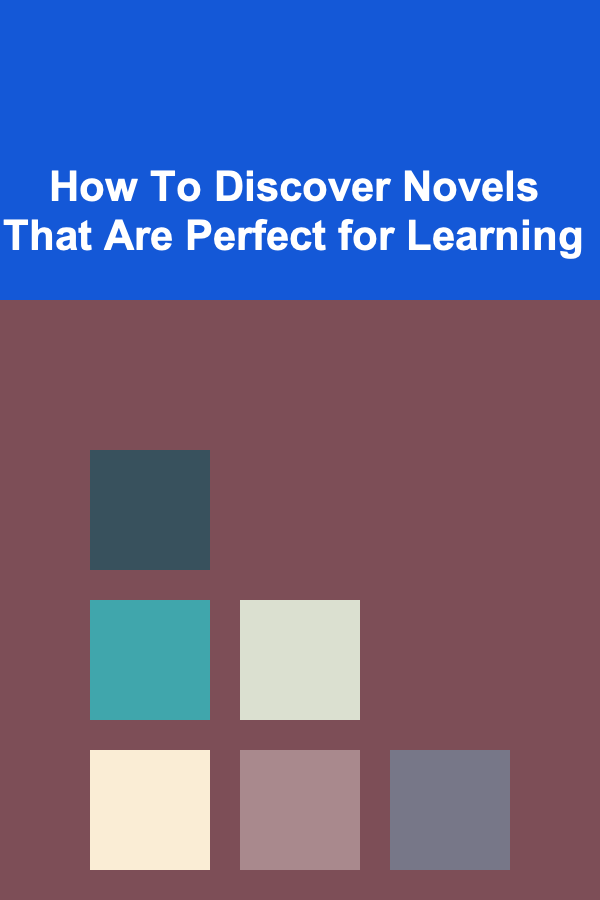
How To Discover Novels That Are Perfect for Learning
ebook include PDF & Audio bundle (Micro Guide)
$12.99$8.99
Limited Time Offer! Order within the next:

Reading novels can be an immensely valuable tool for learning, whether you're looking to improve your language skills, gain deeper insights into human psychology, or even understand the complexities of different cultures. Fiction can teach us about history, social dynamics, and emotions in ways that factual texts often cannot. However, finding the right novels that serve as both entertaining and educational can sometimes be a challenge. This article explores how to discover novels that are perfect for learning, offering insights into selecting books based on specific learning goals, genres, and personal preferences.
The Power of Novels in Learning
Novels are more than just stories for entertainment; they can act as mirrors of society, amplifying real-world issues, providing historical context, and offering psychological insights. Here's why novels are such powerful learning tools:
- Language Acquisition: For learners of new languages, novels offer contextual understanding, helping readers not only expand their vocabulary but also understand the nuances of sentence structures, idioms, and slang. Novels immerse readers in authentic language, which is often more practical and effective than rote memorization from a textbook.
- Cultural Understanding: Novels offer a window into different cultures and societies. By reading fiction set in diverse geographical and historical contexts, you can gain insights into customs, traditions, and worldviews different from your own.
- Emotional Intelligence: Reading novels helps develop emotional intelligence. Understanding the internal struggles and emotional landscapes of characters in stories can improve empathy and emotional awareness in real life.
- Critical Thinking: Novels often present complex situations and dilemmas, pushing readers to think critically about the choices characters make and the consequences of those choices. The analysis of themes, motives, and the author's messages helps develop critical thinking skills.
- History and Society: Historical fiction, in particular, can teach you about different periods in time, providing a more humanized account of events than textbooks often can. These novels breathe life into the facts, offering personal stories and insights that make history more engaging and memorable.
Step 1: Define Your Learning Goals
Before diving into novels, it's essential to first define what you aim to learn. Are you seeking to improve your language skills? Do you want to better understand a specific culture, historical event, or social issue? The novels you choose will vary significantly based on these goals.
Learning Language and Vocabulary
If your primary goal is language acquisition, selecting novels written in the language you're learning can be incredibly helpful. Start with books that match your current level of proficiency and gradually increase the difficulty as you improve.
- Beginner: Choose novels with simple sentence structures and clear, everyday language. Children's books or young adult novels often fit well here.
- Intermediate: Novels with more complex characters and plots, as well as a broader range of vocabulary, can help intermediate learners improve their skills.
- Advanced: Advanced learners should aim for books that feature nuanced language, including idioms, advanced vocabulary, and cultural references.
Gaining Cultural Insights
To learn about different cultures, novels written by authors from those cultures can provide the most authentic perspectives. Reading books that reflect the struggles, beliefs, and traditions of a particular society offers a deeper understanding than watching documentaries or reading articles.
- Cross-Cultural Fiction: Look for novels that focus on cross-cultural experiences or issues like immigration, globalization, and identity. Authors who have lived in multiple countries or who explore multiple cultures in their writing often provide valuable insights into the complexities of modern life.
Understanding Psychology and Human Behavior
Novels that delve into the human psyche can provide immense value in understanding human behavior, motivation, and emotion. Psychological novels often explore mental health, identity, and the complexities of human relationships.
- Psychological Thrillers: These books dive deep into character development, often exploring the darker aspects of human nature. Authors like Dostoevsky or contemporary writers like Gillian Flynn explore psychological tension and its consequences on human behavior.
- Character-Driven Novels: Novels where character development is central to the plot, such as "To Kill a Mockingbird" or "The Catcher in the Rye," can help you explore the human experience in all its complexity.
Studying History Through Fiction
Historical novels can offer a lens through which to explore past events. Whether it's war, social movements, or political shifts, historical novels provide a more humanized and engaging account of history than you might find in traditional textbooks.
- Classics of Historical Fiction: Many classic novels are rooted in specific historical periods. Books like "War and Peace" by Leo Tolstoy, set during the Napoleonic wars, or "The Book Thief" by Markus Zusak, set during World War II, provide historical context through the eyes of their characters.
- Contemporary Historical Fiction: Authors like Hilary Mantel, who wrote "Wolf Hall," offer insight into more recent historical events through complex characters and meticulously researched settings.
Step 2: Choose the Right Genre
Novels come in many genres, each suited to different learning goals. Understanding which genre best fits your needs will allow you to select novels that align with your interests and learning objectives.
Literary Fiction
Literary fiction is often dense and complex, featuring intricate character development, rich themes, and deep psychological insights. These novels tend to focus on the inner workings of the human experience and are ideal for readers seeking to understand human behavior and complex social issues.
- Example: "The Great Gatsby" by F. Scott Fitzgerald -- a novel about the American Dream, societal norms, and the complexities of human relationships.
- Why It's Great for Learning: It encourages deep reflection on social issues and character dynamics.
Historical Fiction
Historical fiction brings the past to life, making history more engaging by humanizing historical events. These novels are excellent for learning about specific periods or societal changes, offering vivid accounts that textbooks may lack.
- Example: "All the Light We Cannot See" by Anthony Doerr -- set during World War II, this novel provides a gripping and emotional portrayal of the war's impact.
- Why It's Great for Learning: It provides a personal and intimate look at historical events, giving readers a sense of what it was like to live through significant moments in history.
Science Fiction and Fantasy
While these genres are often seen as escapism, science fiction and fantasy novels can help with critical thinking, problem-solving, and understanding complex societal structures. These genres often explore dystopian futures, technology's impact on humanity, and speculative ideas about the future.
- Example: "1984" by George Orwell -- a dystopian novel that explores totalitarianism, surveillance, and the consequences of losing individual freedoms.
- Why It's Great for Learning: It challenges readers to think critically about political systems, technology, and the human condition.
Mystery and Crime Fiction
Mystery and crime fiction often require readers to engage in problem-solving and logical reasoning. These novels also delve into the complexities of human motivations and behaviors, making them great for learning about psychology and criminal justice.
- Example: "The Girl with the Dragon Tattoo" by Stieg Larsson -- a gripping mystery that delves into social issues, family dynamics, and justice.
- Why It's Great for Learning: It promotes analytical thinking and offers insights into human behavior and societal issues.
Non-Fiction Novels and Narrative Non-Fiction
Although not strictly fiction, narrative non-fiction offers the compelling storytelling of novels while remaining grounded in real-world facts. These books can provide immense learning opportunities in areas such as history, politics, science, and sociology.
- Example: "Into the Wild" by Jon Krakauer -- a non-fiction narrative that explores the true story of Christopher McCandless's journey and ultimate fate.
- Why It's Great for Learning: It blends storytelling with factual accounts, making complex topics engaging and relatable.
Step 3: Leverage Recommendations and Reviews
Once you've decided on your learning goals and preferred genres, it's time to start searching for novels. There are many ways to discover books that will suit your needs:
- Online Book Lists: Websites like Goodreads, BookBub, and personal blogs often feature lists of books that align with specific learning goals. For example, you can find lists of the best historical fiction novels, books to improve your English, or novels for understanding different cultures.
- Book Reviews: Reading book reviews can give you a better idea of what a novel is about and whether it aligns with your learning objectives. Look for reviews on platforms like Goodreads or in literary magazines.
- Recommendations from Educators or Professionals: Teachers, professors, and even experts in fields like psychology, history, or social sciences often offer book recommendations that serve both educational and entertainment purposes.
- Book Clubs and Reading Groups: Engaging with reading communities can expose you to novels you may not have found on your own. Book clubs often discuss books that are both thought-provoking and informative, making them ideal for learners seeking intellectual stimulation.
Step 4: Read Actively and Engage with the Material
Once you've found the right novels, it's crucial to read them actively. This means engaging with the text beyond just following the plot. Here are some tips to maximize your learning:
- Take Notes: Jot down unfamiliar words, phrases, or concepts. Look them up to improve your vocabulary and understanding.
- Ask Questions: As you read, ask yourself questions about the characters, plot, and themes. What message is the author trying to convey? How does this reflect the real world?
- Join Discussions: Whether online or in person, participating in discussions about the books you read can deepen your understanding and expose you to different perspectives.
- Reread: Some novels are layered with complex meanings that become clearer upon rereading. Don't be afraid to revisit books you've already read to deepen your learning.
Conclusion
Novels are a powerful tool for learning, offering opportunities to develop language skills, understand cultures, explore human behavior, and gain historical insights. By defining your learning goals, selecting the right genre, and actively engaging with the material, you can turn fiction into a valuable educational resource. So, the next time you're looking to learn something new, pick up a novel -- it just might offer the perfect lesson.

10 Effective Ways for Lowering Health Insurance Premiums
Read More
How to Create a Comprehensive Product Testing Checklist
Read More
How to Keep Your Home Calm During Pet Storm Anxiety
Read More
How to Use Mirrors to Make Your Home Look More Expensive
Read More
How To Understand the Power of Hyaluronic Acid
Read More
10 Tips for Creating a Themed TV Night
Read MoreOther Products

10 Effective Ways for Lowering Health Insurance Premiums
Read More
How to Create a Comprehensive Product Testing Checklist
Read More
How to Keep Your Home Calm During Pet Storm Anxiety
Read More
How to Use Mirrors to Make Your Home Look More Expensive
Read More
How To Understand the Power of Hyaluronic Acid
Read More